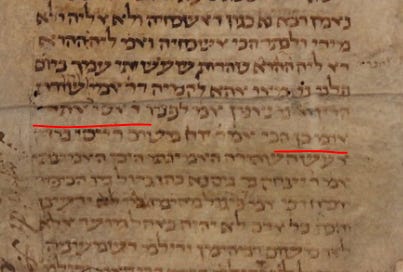"Rabbi", You Say Thusly?
An interesting exchange in Gittin 54b:
הָהוּא דַּאֲמַר לֵיהּ לְחַבְרֵיהּ: טְהָרוֹת שֶׁעָשִׂיתִי עִמְּךָ בְּיוֹם פְּלוֹנִי – נִטְמְאוּ, אֲתָא לְקַמֵּיהּ דְּרַבִּי אַמֵּי, אֲמַר לֵיהּ: שׁוּרַת הַדִּין אֵינוֹ נֶאֱמָן. אָמַר לְפָנָיו רַבִּי אַסִּי: רַבִּי, אַתָּה אוֹמֵר כֵּן? הָכִי אָמַר רַבִּי יוֹחָנָן מִשּׁוּם רַבִּי יוֹסֵי: מָה אֶעֱשֶׂה שֶׁהַתּוֹרָה הֶאֱמִינַתּוּ.
§ It is related that there was a certain person who said to another: The ritually pure food that I prepared with you on such and such a day became ritually impure. The owner of the food came before Rabbi Ami, asking him what to do. Rabbi Ami said to him: You may continue to treat the food as ritually pure, as in principle, the other person is not deemed credible. Rabbi Asi said before him: My teacher, do you say this? So said Rabbi Yoḥanan in the name of Rabbi Yosei: What can I do when I see that the Torah deemed him credible in such a case?
What seems “off” about this is that Rabbi Ammi and Rabbi Assi are colleagues, both students of Rabbi Yochanan. When disagreeing, would one really call the other “my teacher”?!
While most manuscripts have “Rabbi”, two manuscripts lack this word. Thus, Munich 95:
and Bologna (Fr. ebr. 510):
This last one is interesting because it lacks “Rabbi” but then has it inserted above the line, after Assi.
Another interesting point. While the printings all have רבי spelled out in full, the manuscripts that have it, such as Bologna above, only have it as a single ר. This includes Munich, BS: Cod. hebr. 15; Budapest; Vatican 130; and Vatican 140. Thus, for instance, here is Vatican 130:






